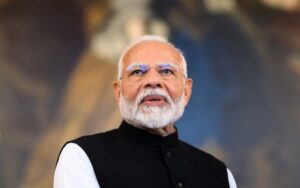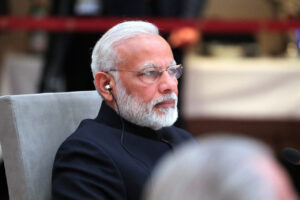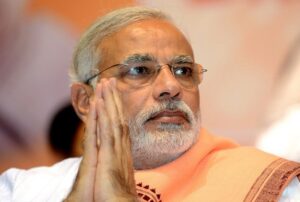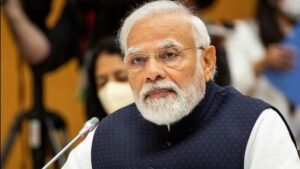
Indian Prime Minister Narendra Modi arrived in Kyiv on the morning of Friday, August 23, the press service of Ukrzaliznytsia reports.
“For the first time in the history of bilateral relations between our countries, the Prime Minister of India personally visited Ukraine. Before his visit to Kyiv on a Ukrzaliznytsia train, Narendra Modi called India a “friend and partner” of Ukraine and expressed hope for a “speedy restoration of peace” and deepening of “Indian-Ukrainian friendship,” the press service said in a Facebook post.
Modi was met by First Deputy Foreign Minister of Ukraine Andriy Sybiga and Director of the State Protocol Department Olena Yalova.
According to The Times of India, during the visit, Modi will share with Ukrainian President Volodymyr Zelenskyy the prospects for a peaceful resolution of the current conflict.
The publication also published footage of Modi’s motorcade in the center of Kyiv.
Ukrainian media published a video of Modi’s meeting with the Indian diaspora in a central Kyiv hotel.
This is the first visit of the Indian Prime Minister to Ukraine since the country gained independence in 1991.

Today marks 365 days since India assumed the G20 Presidency. It is a moment to reflect, recommit, and rejuvenate the spirit of ‘Vasudhaiva Kutumbakam, ‘One Earth, One Family, One Future.’
As we undertook this responsibility last year, the global landscape grappled with multifaceted challenges: recovery from the Covid-19 pandemic, looming climate threats, financial instability, and debt distress in developing nations, all amid declining multilateralism. In the midst of conflicts and competition, development cooperation suffered, impeding progress.
Assuming the G20 Chair, India sought to offer the world an alternative to status quo, a shift from a GDP-centric to human-centric progress. India aimed to remind the world of what unites us, rather than what divides us. Finally, the global conversation had to evolve – the interests of the few had to give way to the aspirations of the many. This required a fundamental reform of multilateralism as we knew it.
Inclusive, ambitious, action-oriented, and decisive—these four words defined our approach as G20 president, and the New Delhi Leaders’ Declaration (NDLD), unanimously adopted by all G20 members, is testimony to our commitment to deliver on these principles.
Inclusivity has been at the heart of our presidency. The inclusion of the African Union (AU) as a permanent member of the G20 integrated 55 African nations into the forum, expanding it to encompass 80% of the global population. This proactive stance has fostered a more comprehensive dialogue on global challenges and opportunities.
The first-of-its-kind ‘Voice of the Global South Summit,’ convened by India in two editions, heralded a new dawn of multilateralism. India mainstreamed the Global South’s concerns in international discourse and has ushered in an era where developing countries take their rightful place in shaping the global narrative.
Inclusivity also infused India’s domestic approach to G20, making it a People’s Presidency that befits that world’s largest democracy. Through “Jan Bhagidari” (people’s participation) events, G20 reached 1.4 billion citizens, involving all states and Union Territories (UTs) as partners. And on substantive elements, India ensured that international attention was directed to broader developmental aims, aligning with G20’s mandate.
At the critical midpoint of the 2030 Agenda, India delivered the G20 2023 Action Plan to Accelerate Progress on the Sustainable Development Goals (SDGs), taking a cross-cutting, action-oriented approach to interconnected issues, including health, education, gender equality and environmental sustainability.
A key area driving this progress is robust Digital Public Infrastructure (DPI). Here, India was decisive in its recommendations, having witnessed the revolutionary impact of digital innovations like Aadhaar, UPI, and Digilocker first-hand. Through G20, we successfully completed the Digital Public Infrastructure Repository, a significant stride in global technological collaboration. This repository, featuring over 50 DPIs from 16 countries, will help the Global South build, adopt, and scale DPI to unlock the power of inclusive growth.
For our One Earth, we introduced ambitious and inclusive aims to create urgent, lasting, and equitable change. The Declaration’s ‘Green Development Pact’ addresses the challenges of choosing between combating hunger and protecting the planet, by outlining a comprehensive roadmap where employment and ecosystems are complimentary, consumption is climate conscious, and production is planet-friendly. In tandem, the G20 Declaration calls for an ambitious tripling of global renewable energy capacity by 2030. Coupled with the establishment of the Global Biofuels Alliance and a concerted push for Green Hydrogen, the G20’s ambitions to build a cleaner, greener world is undeniable. This has always been India’s ethos, and through Lifestyles for Sustainable Development (LiFE), the world can benefit from our age-old sustainable traditions.
Further, the Declaration underscores our commitment to climate justice and equity, urging substantial financial and technological support from the Global North. For the first time, there was a recognition of the quantum jump needed in the magnitude of development financing, moving from billions to trillions of dollars. G20 acknowledged that developing countries require $5.9 trillion to fulfil their Nationally Determined Contributions (NDCs) by 2030.
Given the monumental resources required, G20 emphasised the importance of better, larger, and more effective Multilateral Development Banks. Concurrently, India is taking a leading role in UN reforms, especially in the restructuring of principal organs like the UN Security Council, that will ensure a more equitable global order.
Gender equality took centre stage in the Declaration, culminating in the formation of a dedicated Working Group on the Empowerment of Women next year. India’s Women’s Reservation Bill 2023, reserving one-third of India’s Parliament and state legislative assembly seats for women epitomizes our commitment to women-led development.
The New Delhi Declaration embodies a renewed spirit of collaboration across these key priorities, focusing on policy coherence, reliable trade, and ambitious climate action. It is a matter of pride that during our Presidency, G20 achieved 87 outcomes and 118 adopted documents, a marked rise from the past.
During our G20 Presidency, India led deliberations on geopolitical issues and their impact on economic growth and development. Terrorism and the senseless killing of civilians is unacceptable, and we must address it with a policy of zero-tolerance. We must embody humanitarianism over hostility and reiterate that this is not an era of war.
I am delighted that during our Presidency India achieved the extraordinary: it revitalised multilateralism, amplified the voice of the Global South, championed development, and fought for the empowerment of women, everywhere.
As we hand over the G20 Presidency to Brazil, we do so with the conviction that our collective steps for people, planet, peace, and prosperity, will resonate for years to come.

‘Vasudhaiva Kutumbakam’ – these two words capture a deep philosophy. It means ‘the world is one family’. This is an all-embracing outlook that encourages us to progress as one universal family, transcending borders, languages, and ideologies. During India’s G20 Presidency, this has translated into a call for human-centric progress. As One Earth, we are coming together to nurture our planet. As One Family, we support each other in the pursuit of growth. And we move together towards a shared future – One Future – which is an undeniable truth in these interconnected times.
The post-pandemic world order is very different from the world before it. There are three important changes, among others.
First, there is a growing realisation that a shift away from a GDP-centric view of the world to a human-centric view is needed.
Second, the world is recognizing the importance of resilience and reliability in global supply chains.
Third, there is a collective call for boosting multilateralism through the reform of global institutions.
Our G20 Presidency has played the role of a catalyst in these shifts.
In December 2022, when we took over the Presidency from Indonesia, I had written that a mindset shift must be catalysed by the G20. This was especially needed in the context of mainstreaming the marginalized aspirations of developing countries, the Global South and Africa.
The Voice of Global South Summit in January 2023, which witnessed participation from 125 countries, was one of the foremost initiatives under our Presidency. It was an important exercise to gather inputs and ideas from the Global South. Further, our Presidency has not only seen the largest-ever participation from African countries but has also pushed for the inclusion of the African Union as a permanent member of the G20.
An interconnected world means our challenges across domains are interlinked. This is the midway year of the 2030 Agenda and many are noting with great concern that the progress on SDGs is off-track. The G20 2023 Action Plan on Accelerating Progress on SDGs will spearhead the future direction of the G20 towards implementing SDGs.
In India, living in harmony with nature has been a norm since ancient times and we have been contributing our share towards climate action even in modern times.
Many countries of the Global South are at various stages of development and climate action must be a complementary pursuit. Ambitions for climate action must be matched with actions on climate finance and transfer of technology.
We believe there is a need to move away from a purely restrictive attitude of what should not be done, to a more constructive attitude focusing on what can be done to fight climate change.
The Chennai High-Level Principles for a Sustainable and Resilient Blue Economy focus on keeping our oceans healthy.
A global ecosystem for clean and green hydrogen will emerge from our presidency, along with a Green Hydrogen Innovation Centre.
In 2015, we launched the International Solar Alliance. Now, through the Global Biofuels Alliance, we will support the world to enable energy transitions in tune with the benefits of a circular economy.
Democratising climate action is the best way to impart momentum to the movement. Just as individuals make daily decisions based on their long-term health, they can make lifestyle decisions based on the impact on the planet’s long-term health. Just like Yoga became a global mass movement for wellness, we have also nudged the world with Lifestyles for Sustainable Environment (LiFE).
Due to the impact of climate change, ensuring food and nutritional security will be crucial. Millets, or Shree Anna, can help with this while also boosting climate-smart agriculture. In the International Year of Millets, we have taken millets to global palates. The Deccan High Level Principles on Food Security and Nutrition is also helpful in this direction.
Technology is transformative but it also needs to be made inclusive. In the past, the benefits of technological advancements have not benefited all sections of society equally. India, over the last few years, has shown how technology can be leveraged to narrow inequalities, rather than widen them.
For instance, the billions across the world that remain unbanked, or lack digital identities, can be financially included through digital public infrastructure (DPI). The solutions we have built using our DPI have now been recognised globally. Now, through the G20, we will help developing countries adapt, build, and scale DPI to unlock the power of inclusive growth.
That India is the fastest-growing large economy is no accident. Our simple, scalable and sustainable solutions have empowered the vulnerable and the marginalised to lead our development story. From space to sports, economy to entrepreneurship, Indian women have taken the lead in various sectors. They have shifted the narrative from the development of women to women-led development. Our G20 Presidency is working on bridging the gender digital divide, reducing labour force participation gaps and enabling a larger role for women in leadership and decision-making.
For India, the G20 Presidency is not merely a high-level diplomatic endeavour. As the Mother of Democracy and a model of diversity, we opened the doors of this experience to the world.
Today, accomplishing things at scale is a quality that is associated with India. The G20 Presidency is no exception. It has become a people-driven movement. Over 200 meetings will have been organised in 60 Indian cities across the length and breadth of our nation, hosting nearly 100,000 delegates from 125 countries by the end of our term. No Presidency has ever encompassed such a vast and diverse geographical expanse.
It is one thing to hear about India’s demography, democracy, diversity and development from someone else. It is totally different to experience them first-hand. I am sure our G20 delegates would vouch for this.
Our G20 Presidency strives to bridge divides, dismantle barriers, and sow seeds of collaboration that nourish a world where unity prevails over discord, where shared destiny eclipses isolation. As the G20 President, we had pledged to make the global table larger, ensuring that every voice is heard and every country contributes. I am positive that we have matched our pledge with actions and outcomes.
Narendra Modi
Prime Minister of India

President of Ukraine Volodymyr Zelensky had a conversation with Prime Minister of India Narendra Modi.
“With Indian Prime Minister Narendra Modi we discussed the so-called “referendums” that Russia recently held in the temporarily occupied territories of our state. We also talked about food, nuclear security, cooperation within international organizations, primarily the UN. It is important to strengthen the Ukrainian-Indian partnership amid Russian aggression against Ukraine,” Zelensky wrote on his Telegram channel.
He also thanked India for supporting the sovereignty and territorial integrity of Ukraine. “We appreciate the significant humanitarian assistance provided by the Indian government and the private sector,” the president said.
According to the press service of the head of state, during the conversation, Zelensky said that Ukraine is not going to conduct any negotiations with the current president of the Russian Federation, and also said that the Ukrainian side has always been committed to a peaceful settlement.
“However, Russia did not stand for dialogue, but put forward ultimatums and deliberately undermined this process. During my speech at the UN General Assembly session, I outlined our clear formula for peace. We are ready to work together with partners to achieve it,” the president added.
He also said that Ukraine is ready to continue acting as a guarantor of food security in the world. In this regard, the support of the entire international community, in particular India, for the further implementation of the grain initiative is important.
Zelensky also recalled nuclear blackmail by the Russian leadership, including at the occupied Zaporizhia nuclear power plant.
“Nuclear blackmail by Russia, in particular, regarding the Zaporizhia nuclear power plant, poses a threat not only to Ukraine, but to the whole world,” Zelensky said.
The President also renewed the invitation to the Prime Minister of India to pay a visit to Ukraine.